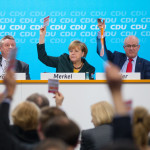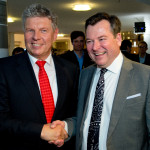Neither Merkel nor Steinbrück Score a Knockout
Neither Merkel nor Steinbrück Score a Knockout by Nick Sauter
German Chancellor Angela Merkel and her opponent Peer Steinbrück both failed to make a decisive impression during their debate on national television last Sunday night. According to recent surveys, Merkel, who runs for the right-center party (CDU), and has been in office since 2005, managed to impress the TV audience with both her coolness and arguments on economic topics, while social-democratic candidate and former finance minister Steinbrück (SPD) had convincing arguments on issues such as a general minimum wage. However, no candidate was able to score a “knockout”.
Most surveys said the debate ended in a draw and that neither Merkel nor Steinbrück should put too much hope on the debate being a decisive factor in the upcoming national elections on September 22. On foreign issues, both candidates agreed that Germany should not join a new “coalition of the willing” to bomb or invade Syria. However, Merkel said that Germany could eventually get involved in a military attack, should there be a UN mandate.
German daily newspapers Der Bild and Die Welt considered co-host Stefan Raab the winner of the night. The ProSieben-showmaster managed to garner a new reputation as a serious political journalist. Critics said that Merkel appeared to be far less nervous than her opponent, who at times failed to answer the questions he was asked, instead rattling off excerpts taken from SPD’s manifesto; a tactic co-host Anne Will also criticised harshly.
Recent figures show the Chancellor Debate did not have a huge impact on Germany’s undecided swing voters – a group of voters Steinbrück’s campaign is relying on heavily. Experts predict a result that will lead the country back to a “Grosse Koalition (Grand Coalition)” between CDU and SPD. The two parties governed the Federal Republic from 1969 until 1972, and then again from 2005 until 2009.






 Euro Converter
Euro Converter